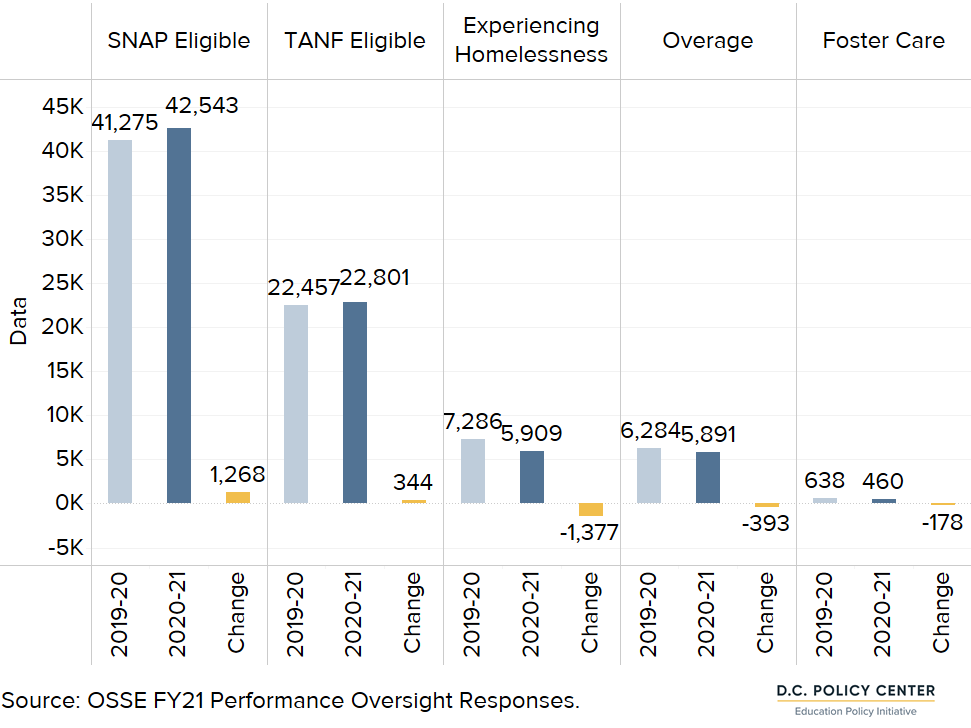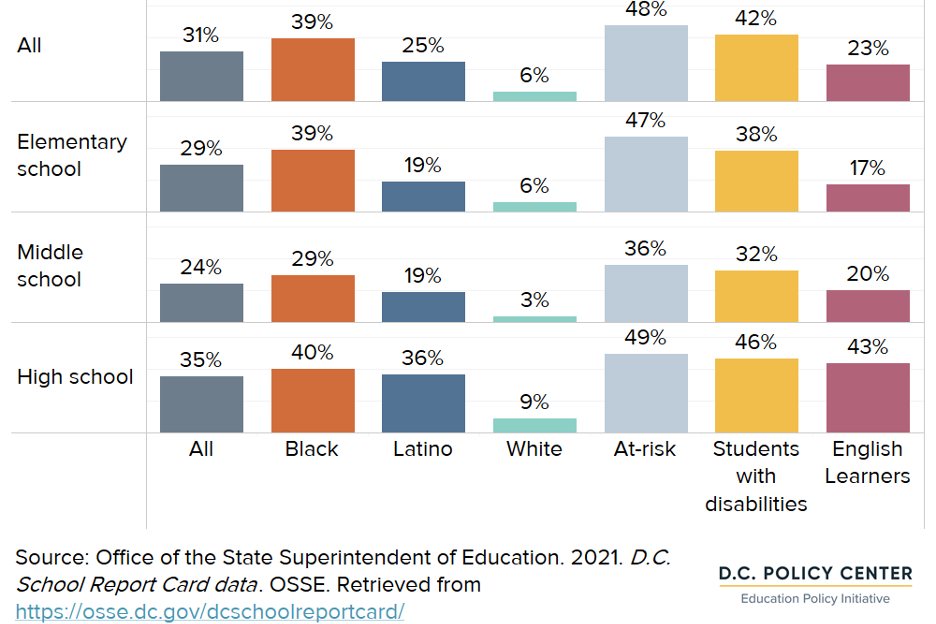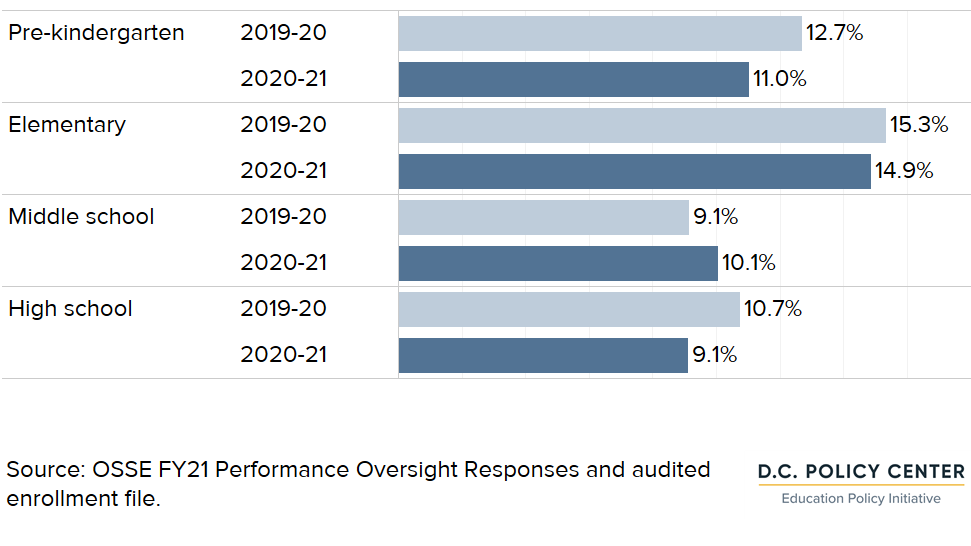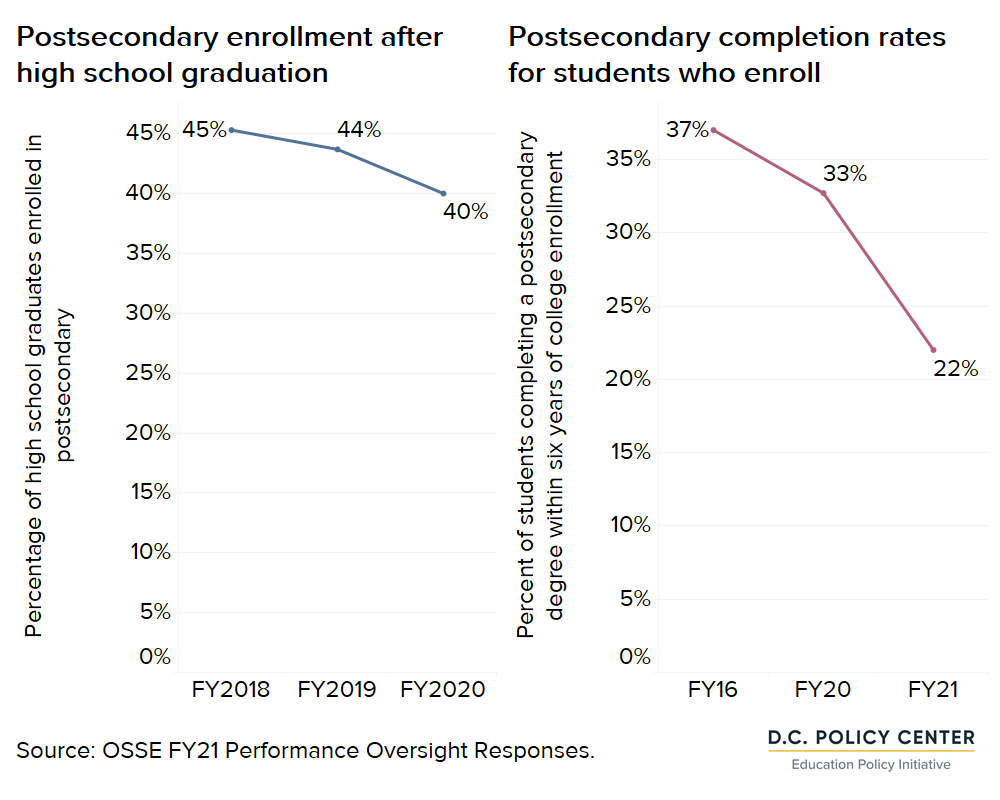
On Wednesday, March 2, 2022, Education Policy Initiative Director Chelsea Coffin testified before D.C. Council Committee of the Whole during their Performance Oversight Hearing, and previewed findings from the State of D.C. Schools 2020-21. You can read her testimony below or download a copy.
Good morning, Chairman Mendelson and members of the Committee of the Whole. My name is Chelsea Coffin and I am the Director of the Education Policy Initiative at the D.C. Policy Center, an independent think tank focused on advancing policies for a growing and vibrant economy in D.C. Today, I will preview findings from State of D.C. Schools, 2020-21 to show how the pandemic has disproportionately impacted students designated as at-risk, students with disabilities, English learners, and high school graduates. It is critical to invest both in supporting these students moving forward and monitoring their outcomes.
The forthcoming State of D.C. Schools report shows that the pandemic year had disparate impacts for many students, including students designated as at-risk. First, likely because of the economic impacts of the pandemic, there was an increase in the percentage of students designated as at-risk to 45 percent, two percentage points higher than the previous year (see Figure 1). This was mostly driven by an increase in the number of students who were eligible for SNAP – the numbers of students in foster care, experiencing homelessness, or overage decreased. During this year of largely virtual learning, students designated as at-risk were less likely to engage in school. Compared to all students, they were 1.5 times more likely to be chronically absent (see Figure 2) and they missed three days of pre-kindergarten every two weeks compared to all pre-kindergarteners who missed two days over the same period.
Figure 1. Students designated as at-risk by category

Figure 2. Chronic absenteeism rates by student group and grade band, school year 2020-21

The State of D.C. Schools report also finds that, although virtual options are preferred by some, certain services for students with disabilities and English learners can be challenging to deliver virtually. Performance oversight data from OSSE indicate that the percentages of English learners and students with disabilities likely entering D.C.’s public schools for the first time have declined. This could mean that identifying needs was delayed during the virtual year (for many reasons, but the difficulty of completing certain assessments virtually, for one). The percentage of students who are English learners declined by about two percentage points in both pre-kindergarten and high school grades (see Figure 3), with pre-kindergarten and grade 9 as common entry points in a typical year.1 In addition, the percentage of pre-kindergarten students who are students with disabilities declined from 8 percent in 2019-20 to 6 percent in 2020-21.
Figure 3. English learners as a percentage of audited enrollment

Each age group and grade band had unique challenges, but the pandemic had particularly harsh impacts for youth getting ready for college. The State of D.C. Schools report finds that although high school graduation rates increased, measures of college and career readiness for high school students showed a decline. For D.C.’s high school alumni, performance oversight data show that a smaller share continued with postsecondary education compared to previous years (see Figure 4). In FY20 (the most recent year with complete data from the National Student Clearinghouse), the percentage of students enrolling in postsecondary after graduation declined to 40 percent, four percentage points lower than the previous year. In addition, the percentage completing a postsecondary degree within six years of enrolling decreased to 22 percent in FY21, 11 percentage points lower than FY20 (and 15 percentage points lower than FY16, the only other earlier year with data).
Figure 4. Postsecondary enrollment after high school graduation, and postsecondary completion rates for students who enroll

For many students, recovering from the impacts of COVID-19 will be hard. Tracking how students are doing, and how schools are serving them will be key to recovery. We are glad that the DME Recovery Roadmap is focused on this. In our State of D.C. Schools report, we have also suggested recovery metrics in the areas of student academic success, supports for students, and community factors that influence students’ ability to fully engage in school. Using these frameworks, we need to focus on equitable recovery and invest in collecting information that can help track these outcomes, especially for students designated as at-risk, students with disabilities, English learners, and former high school students.
Thank you for your time. I am happy to answer any questions you may have.
Endnotes
- Office of the State Superintendent of Education (OSSE). 2021. “English Learners in DC: 2019-20 and 2020-21 Data.” OSSE. Retrieved from https://osse.dc.gov/sites/default/files/dc/sites/osse/page_content/attachments/1920-2021%20English%20Learners%20in%20DC.pdf
